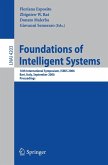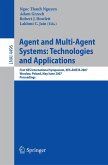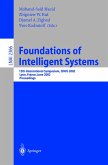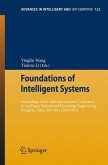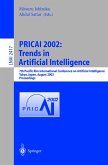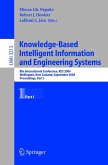Foundations of Intelligent Systems (eBook, PDF)
15th International Symposium ISMIS 2005, Saratoga Springs, NY, USA, May 25-28, 2005, Proceedings
Redaktion: Hacid, Mohand-Said; Tsumoto, Shusaku; Ras, Zbigniew W.
73,95 €
73,95 €
inkl. MwSt.
Sofort per Download lieferbar

37 °P sammeln
73,95 €
Als Download kaufen

73,95 €
inkl. MwSt.
Sofort per Download lieferbar

37 °P sammeln
Jetzt verschenken
Alle Infos zum eBook verschenken
73,95 €
inkl. MwSt.
Sofort per Download lieferbar
Alle Infos zum eBook verschenken

37 °P sammeln
Foundations of Intelligent Systems (eBook, PDF)
15th International Symposium ISMIS 2005, Saratoga Springs, NY, USA, May 25-28, 2005, Proceedings
Redaktion: Hacid, Mohand-Said; Tsumoto, Shusaku; Ras, Zbigniew W.
- Format: PDF
- Merkliste
- Auf die Merkliste
- Bewerten Bewerten
- Teilen
- Produkt teilen
- Produkterinnerung
- Produkterinnerung

Bitte loggen Sie sich zunächst in Ihr Kundenkonto ein oder registrieren Sie sich bei
bücher.de, um das eBook-Abo tolino select nutzen zu können.
Hier können Sie sich einloggen
Hier können Sie sich einloggen
Sie sind bereits eingeloggt. Klicken Sie auf 2. tolino select Abo, um fortzufahren.

Bitte loggen Sie sich zunächst in Ihr Kundenkonto ein oder registrieren Sie sich bei bücher.de, um das eBook-Abo tolino select nutzen zu können.
- Geräte: PC
- ohne Kopierschutz
- eBook Hilfe
- Größe: 8.07MB
Andere Kunden interessierten sich auch für
![Foundations of Intelligent Systems (eBook, PDF) Foundations of Intelligent Systems (eBook, PDF)]() Foundations of Intelligent Systems (eBook, PDF)73,95 €
Foundations of Intelligent Systems (eBook, PDF)73,95 €![Agent and Multi-Agent Systems: Technologies and Applications (eBook, PDF) Agent and Multi-Agent Systems: Technologies and Applications (eBook, PDF)]() Agent and Multi-Agent Systems: Technologies and Applications (eBook, PDF)73,95 €
Agent and Multi-Agent Systems: Technologies and Applications (eBook, PDF)73,95 €![Knowledge-Based Intelligent Information and Engineering Systems (eBook, PDF) Knowledge-Based Intelligent Information and Engineering Systems (eBook, PDF)]() Knowledge-Based Intelligent Information and Engineering Systems (eBook, PDF)91,95 €
Knowledge-Based Intelligent Information and Engineering Systems (eBook, PDF)91,95 €![Foundations of Intelligent Systems (eBook, PDF) Foundations of Intelligent Systems (eBook, PDF)]() Foundations of Intelligent Systems (eBook, PDF)73,95 €
Foundations of Intelligent Systems (eBook, PDF)73,95 €![Foundations of Intelligent Systems (eBook, PDF) Foundations of Intelligent Systems (eBook, PDF)]() Foundations of Intelligent Systems (eBook, PDF)395,95 €
Foundations of Intelligent Systems (eBook, PDF)395,95 €![PRICAI 2002: Trends in Artificial Intelligence (eBook, PDF) PRICAI 2002: Trends in Artificial Intelligence (eBook, PDF)]() PRICAI 2002: Trends in Artificial Intelligence (eBook, PDF)73,95 €
PRICAI 2002: Trends in Artificial Intelligence (eBook, PDF)73,95 €![Knowledge-Based Intelligent Information and Engineering Systems (eBook, PDF) Knowledge-Based Intelligent Information and Engineering Systems (eBook, PDF)]() Knowledge-Based Intelligent Information and Engineering Systems (eBook, PDF)40,95 €
Knowledge-Based Intelligent Information and Engineering Systems (eBook, PDF)40,95 €-
-
-
Produktdetails
- Verlag: Springer Berlin Heidelberg
- Seitenzahl: 706
- Erscheinungstermin: 2. Mai 2005
- Englisch
- ISBN-13: 9783540319498
- Artikelnr.: 44225409
Dieser Download kann aus rechtlichen Gründen nur mit Rechnungsadresse in A, B, BG, CY, CZ, D, DK, EW, E, FIN, F, GR, HR, H, IRL, I, LT, L, LR, M, NL, PL, P, R, S, SLO, SK ausgeliefert werden.
- Herstellerkennzeichnung Die Herstellerinformationen sind derzeit nicht verfügbar.
Mohand-Said Hacid, Université Claude Bernard Lyon 1, Villeurbanne Cedex, France / Zbigniew W. Ras, University of North Carolina, Charlotte, NC, USA / Shusaku Tsumoto, Shimane Medial University, Izumo, Japan
Invited Papers.- Methodologies for Automated Telephone Answering.- Anomaly Detection in Computer Security and an Application to File System Accesses.- Regular Papers.- A Machine Text-Inspired Machine Learning Approach for Identification of Transmembrane Helix Boundaries.- Visualization of Similarities and Dissimilarities in Rules Using Multidimensional Scaling.- Learning Profiles Based on Hierarchical Hidden Markov Model.- Statistical Independence from the Viewpoint of Linear Algebra.- Bitmap Index-Based Decision Trees.- On Automatic Modeling and Use of Domain-Specific Ontologies.- Using Self-Adaptable Probes for Dynamic Parameter Control of Parallel Evolutionary Algorithms.- Robust Inference of Bayesian Networks Using Speciated Evolution and Ensemble.- Mining the Semantic Web: A Logic-Based Methodology.- Analysis of Textual Data with Multiple Classes.- SARM - Succinct Association Rule Mining: An Approach to Enhance Association Mining.- Learning the Daily Model of Network Traffic.- ARGUS: Rete + DBMS = Efficient Persistent Profile Matching on Large-Volume Data Streams.- Failing Queries in Distributed Autonomous Information System.- Evaluation of Two Systems on Multi-class Multi-label Document Classification.- Uncertain Knowledge Gathering: An Evolutionary Approach.- Duality in Knowledge Compilation Techniques.- Data Protection in Distributed Database Systems.- A Softened Formulation of Inductive Learning and Its Use for Coronary Disease Data.- Subsystem Based Generalizations of Rough Set Approximations.- Model-Based Cluster Analysis for Web Users Sessions.- On Autonomous k-Means Clustering.- CSI: Clustered Segment Indexing for Efficient Approximate Searching on the Secondary Structure of Protein Sequences.- Using Supervised Clustering to Enhance Classifiers.-Modelling Good Entry Pages on the Web.- A Query Expression and Processing Technique for an XML Search Engine.- Adapting the Object Role Modelling Method for Ontology Modelling.- Identifying Content Blocks from Web Documents.- Building the Data Warehouse of Frequent Itemsets in the DWFIST Approach.- Normal Forms for Knowledge Compilation.- On the Approximate Division of Fuzzy Relations.- Efficient Learning of Pseudo-Boolean Functions from Limited Training Data.- Discovering Partial Periodic Sequential Association Rules with Time Lag in Multiple Sequences for Prediction.- Mining and Filtering Multi-level Spatial Association Rules with ARES.- Association Reducts: A Framework for Mining Multi-attribute Dependencies.- Frequent Pattern Mining with Preferences-Utility Functions Approach.- Semantic-Based Access to Digital Document Databases.- Statistical Database Modeling for Privacy Preserving Database Generation.- Scalable Inductive Learning on Partitioned Data.- Agent-Based Home Simulation and Control.- Aggregates and Preferences in Logic Programming.- The Chisholm Paradox and the Situation Calculus.- A Logic Approach for LTL System Modification.- Anticipatory Agents Based on Anticipatory Reasoning.- Extracting Emotions from Music Data.- An Intelligent System for Assisting Elderly People.- Multi-strategy Instance Selection in Mining Chronic Hepatitis Data.- A Probabilistic Approach to Finding Geometric Objects in Spatial Datasets of the Milky Way.- Towards Ad-Hoc Rule Semantics for Gene Expression Data.- Flexible Pattern Discovery with (Extended) Disjunctive Logic Programming.- Interactive SOM-Based Gene Grouping: An Approach to Gene Expression Data Analysis.- Some Theoretical Properties of Mutual Information for Student Assessments in Intelligent Tutoring Systems.-Cooperative Query Answering for RDF.- Intelligent Information Retrieval for Web-Based Design Data Repository.- Incremental Collaborative Filtering for Highly-Scalable Recommendation Algorithms.- A Distance-Based Algorithm for Clustering Database User Sessions.- User-Interest-Based Document Filtering via Semi-supervised Clustering.- A Filter Feature Selection Method for Clustering.- Automatic Determination of the Number of Fuzzy Clusters Using Simulated Annealing with Variable Representation.- Experimental Analysis of the Q-Matrix Method in Knowledge Discovery.- Clustering Time-Series Medical Databases Based on the Improved Multiscale Matching.- Efficient Causal Interaction Learning with Applications in Microarray.- A Dynamic Adaptive Sampling Algorithm (DASA) for Real World Applications: Finger Print Recognition and Face Recognition.- Catching the Picospams.- Personalized Peer Filtering for a Dynamic Information Push.- Getting Computers to See Information Graphics So Users Do Not Have to.- A Data Model Based on Paraconsistent Intuitionistic Fuzzy Relations.- Logical Data Independence Reconsidered (Extended Abstract).- Estimation of the Density of Datasets with Decision Diagrams.
Invited Papers.- Methodologies for Automated Telephone Answering.- Anomaly Detection in Computer Security and an Application to File System Accesses.- Regular Papers.- A Machine Text-Inspired Machine Learning Approach for Identification of Transmembrane Helix Boundaries.- Visualization of Similarities and Dissimilarities in Rules Using Multidimensional Scaling.- Learning Profiles Based on Hierarchical Hidden Markov Model.- Statistical Independence from the Viewpoint of Linear Algebra.- Bitmap Index-Based Decision Trees.- On Automatic Modeling and Use of Domain-Specific Ontologies.- Using Self-Adaptable Probes for Dynamic Parameter Control of Parallel Evolutionary Algorithms.- Robust Inference of Bayesian Networks Using Speciated Evolution and Ensemble.- Mining the Semantic Web: A Logic-Based Methodology.- Analysis of Textual Data with Multiple Classes.- SARM - Succinct Association Rule Mining: An Approach to Enhance Association Mining.- Learning the Daily Model of Network Traffic.- ARGUS: Rete + DBMS = Efficient Persistent Profile Matching on Large-Volume Data Streams.- Failing Queries in Distributed Autonomous Information System.- Evaluation of Two Systems on Multi-class Multi-label Document Classification.- Uncertain Knowledge Gathering: An Evolutionary Approach.- Duality in Knowledge Compilation Techniques.- Data Protection in Distributed Database Systems.- A Softened Formulation of Inductive Learning and Its Use for Coronary Disease Data.- Subsystem Based Generalizations of Rough Set Approximations.- Model-Based Cluster Analysis for Web Users Sessions.- On Autonomous k-Means Clustering.- CSI: Clustered Segment Indexing for Efficient Approximate Searching on the Secondary Structure of Protein Sequences.- Using Supervised Clustering to Enhance Classifiers.-Modelling Good Entry Pages on the Web.- A Query Expression and Processing Technique for an XML Search Engine.- Adapting the Object Role Modelling Method for Ontology Modelling.- Identifying Content Blocks from Web Documents.- Building the Data Warehouse of Frequent Itemsets in the DWFIST Approach.- Normal Forms for Knowledge Compilation.- On the Approximate Division of Fuzzy Relations.- Efficient Learning of Pseudo-Boolean Functions from Limited Training Data.- Discovering Partial Periodic Sequential Association Rules with Time Lag in Multiple Sequences for Prediction.- Mining and Filtering Multi-level Spatial Association Rules with ARES.- Association Reducts: A Framework for Mining Multi-attribute Dependencies.- Frequent Pattern Mining with Preferences-Utility Functions Approach.- Semantic-Based Access to Digital Document Databases.- Statistical Database Modeling for Privacy Preserving Database Generation.- Scalable Inductive Learning on Partitioned Data.- Agent-Based Home Simulation and Control.- Aggregates and Preferences in Logic Programming.- The Chisholm Paradox and the Situation Calculus.- A Logic Approach for LTL System Modification.- Anticipatory Agents Based on Anticipatory Reasoning.- Extracting Emotions from Music Data.- An Intelligent System for Assisting Elderly People.- Multi-strategy Instance Selection in Mining Chronic Hepatitis Data.- A Probabilistic Approach to Finding Geometric Objects in Spatial Datasets of the Milky Way.- Towards Ad-Hoc Rule Semantics for Gene Expression Data.- Flexible Pattern Discovery with (Extended) Disjunctive Logic Programming.- Interactive SOM-Based Gene Grouping: An Approach to Gene Expression Data Analysis.- Some Theoretical Properties of Mutual Information for Student Assessments in Intelligent Tutoring Systems.-Cooperative Query Answering for RDF.- Intelligent Information Retrieval for Web-Based Design Data Repository.- Incremental Collaborative Filtering for Highly-Scalable Recommendation Algorithms.- A Distance-Based Algorithm for Clustering Database User Sessions.- User-Interest-Based Document Filtering via Semi-supervised Clustering.- A Filter Feature Selection Method for Clustering.- Automatic Determination of the Number of Fuzzy Clusters Using Simulated Annealing with Variable Representation.- Experimental Analysis of the Q-Matrix Method in Knowledge Discovery.- Clustering Time-Series Medical Databases Based on the Improved Multiscale Matching.- Efficient Causal Interaction Learning with Applications in Microarray.- A Dynamic Adaptive Sampling Algorithm (DASA) for Real World Applications: Finger Print Recognition and Face Recognition.- Catching the Picospams.- Personalized Peer Filtering for a Dynamic Information Push.- Getting Computers to See Information Graphics So Users Do Not Have to.- A Data Model Based on Paraconsistent Intuitionistic Fuzzy Relations.- Logical Data Independence Reconsidered (Extended Abstract).- Estimation of the Density of Datasets with Decision Diagrams.

